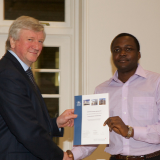Why We Sleep (2017) Book Summary & Insights
Book Title: Why We Sleep
Subtitle: Unlocking The Power Of Sleep And Dreams
Publication Date: 2017
Author Name: Matthew Walker
About The Author
Sleep is one of the most important aspects of our life, health and longevity and we ignore it in the twenty-first century society, with devastating consequences: every major disease in the developed world — Alzheimer’s, cancer, obesity, diabetes — has very strong links to deficient sleep.
In this book, the first of its kind written by a scientific expert, Professor Matthew Walker explores twenty years of innovative research to solve the mystery of why sleep matters. Looking at creatures from across the animal kingdom and major human studies, Why We Sleep delves into everything from what really happens during REM sleep to how caffeine and alcohol affect sleep and why our sleep patterns change across a lifetime, transforming our appreciation of the extraordinary phenomenon that safeguards our existence.
Book Summary
This is a book that gives reasons for having a good amount of sleep. It discusses the issues involved with bad lifestyle choices and encourages us to engage ourselves in daylight activities to have better sleep at night.
Who Is This Book For?
It is for people with sleeping disorders and any other person who needs an incentive to make better lifestyle choices.
Buy Book: Support The Book Author And Our Work
Great books should be read, studied, and reviewed frequently, so reading the actual book may provide more value to you than the book insights on this page. Besides, this would support the work of the book author and what we do on LarnEdu. What could be better?
Important Notes
We get a small compensation from Amazon when you visit your nearest/local Amazon site via our affiliate link to purchase an item within 24 hours or if you add it to your cart and checkout within 90 days. This is no additional cost to you and supports our work.
The information on this page is meant to supplement the actual book(it is not a book review but distils the key insights or ideas from the book in under 5000 words). The content creator or LarnEdu does not necessarily support the views, thoughts, and opinions expressed in the text/book. Reasonable skepticism should be applied with any views, thoughts or opinions expressed/shared by the book author or content creator.
Reading the contents of this page does not guarantee specific results. The best lessons are achieved from taking consistent action in the real world rather than being addicted to the illusion of progress by getting stuck on reading an infinite amount of books or book summaries and insights. LarnEdu and the content creator accepts no responsibility or liability for the accuracy of the information on this page or how it is used.
Book Insights

Introduction
In our tech controlled society, we live our lives on the go, with goods and services at our fingertips and information flying through at the speed of light. Because of this, there are cities that do not sleep and with the Internet at our disposal, there are millions of businesses offering 24 hour services with people being awake in all that time. But this does not mean the importance of sleep has waned as our technological powers has increased. We need sleep now more than ever because a lack of it might prove detrimental to our physical, social, and psychological health. Stick with us as we take you through the reasons you need to have adequate sleep and while you’re at it, do not take a nap.
Your Sleep Pattern Is Ruled By Your Hormones
Do you know you spend over 30% of your life sleeping? This is because out of 24 hours in a day, your body needs about 8 hours of sleep to feel rejuvenated and refreshed. Two processes control the human body sleep pattern. These are the circadian rhythms and the sleep drive.
Circadian rhythms is a biological clock located inside your brain that tells you when to sleep and when to wake up. That is why for most humans, they feel sleepy during the night and wake up during the day. Circadian rhythm triggers drowsiness and it’s the alarm clock that naturally wakes you up in the morning feeling refreshed and reinvigorated.
The sharpest dip in energy levels for most adults occurs between the hours of 2am and 4am and also in the afternoons immediately past lunch time. But these times can be different if you are a late sleeper or early bird. The circadian rhythm receives control from a portion of the hypothalamus and is influenced by external factors such as the brightness or darkness of the day. When it gets to nighttime, the eyes trigger a signal to the brain which releases melatonin — a catalyst for inducing sleep and this makes you feel drowsy, this is the reason your circadian rhythm aligns with the daytime and nighttime. Circadian rhythms work best when there is a regular pattern to follow, and that is why events like jet lag throws your body out of joint.
Sleep drive is your body’s biological craving for sleep. And this can fluctuate depending on your activities. Just like circadian rhythm, sleep drive is from a hormone called adenosine. When we rise in the morning after a good sleep, our sleep drive is low because we woke up and don‘t want to sleep. But as we go about our daily activities, our sleep drive increases until it’s so high we have to sleep again. The significance of this is, the longer we stay awake the greater our sleep drive. So how does this relate to adenosine? When the body wakes up, your adenosine levels are low. But throughout the day, your adenosine levels keep increasing until it reaches an apex and you sleep again.
Lack Of Sleep Leads To Health Complications
A good bed rest helps you start your day but what if you were getting little to no sleep? There are many health issues related to sleep and not resolving them may lead to death. We have the latest technologies and the best scientists but still do not know why the body needs the sleep it does. We should get 8hrs of sleep as the optimum amount for a healthy living but there are negative effects to sleep deprivation such as;
1. Hypertension
Having as little as 4 hours of sleep in a day can increase your chances of hypertension. This is because sleep helps our bodies reduce stress and a lack of proper sleep can exponentially increase the stress hormones in your body which in the long run can lead to hypertension
2, Obesity
Fluctuation in sleep cycle caused by a lack of proper sleep increased the amount of cortisol produced by the body and this increases anxiety which is a leading cause of an emotional binge eating and bad food regimen. There is also the excessive production of ghrelin which causes sleep deficiency and an excessive amount of ghrelin in the body can make you feel hungrier than usual.
3. Heart attack
Sleep deficiency is a leading cause cardiovascular diseases like a stroke and heart attack. We know this deficiency leads to disruption in the brain segment which regulates the circulatory system and this may lead to inflammation which increases the chances of a blood clot in the body.
Sleep Is Necessary For All Animals Though Not The Same Type Or Amount Of Sleep
Bats
Bats are the only animals who sleep hanging upside down. They have a circulation which enables them stay that way without having a rush of blood to the head.
Giraffes
Giraffes do not go into REM sleep. The jungle is a very violent place and because of this, giraffes only nap for 5 minutes at a time and can sometimes only sleep for 30 minutes in a day. Should they go into a deep sleep, they’d probably turn into a lion’s lunch in due time.
Dolphins
These animals unlike humans consciously remind themselves to breathe if not they’d drown in the water so they shut down half their brain while they sleep. They also sleep with one eye close to watch out for predators who would like to have them for lunch or dinner. This is uni-hemispheric sleep and they also sleep as they swim.
Great Frigate Birds
These birds are migratory birds and because of this, they can stay up in the air for months at a time. They sleep while flying and this happens extremely quickly between 7 – 12 seconds at a stretch. They can have up to 40 minutes of sleep in 24 hours.
Walrus
Walruses sleep on land and water. They may sleep for short amounts of time in the water but can sleep for up to 19 hours in a day on land.
Driving Drowsy Is Dangerous Than Driving Drunk
When you get inside your car feeling drowsy, you can bet this has happened to lots of people before. Sixty percent of drivers in the United States are culpable of this and as much as 30% of people have taken a nap behind the wheel. Driving with fatigue may seem like a little deal, but there could be fatal consequences. Chances are, you could send yourself and a third party to an early grave when you drive drowsy.
Driving drowsy is perilous because sleep deficiency can have the same effects on your body like alcohol ingestion. Staying awake for 18 hours at a time will make you handle the wheel like a person with a 0.5 level of alcohol in the bloodstream. Going a day without sleep and driving a vehicle is the same as having 0.10 level of alcohol in your system – with 0.8 considered as drunk.
Drowsy and drunk driving make it difficult to focus on the road and reduce your chance of making split-second decisions. But despite these similarities, they are both not the same. Drowsy driving is far more deadly because while a drunk driver may have poor reaction time and reflexes on the road, a drowsy driver sleeping on the wheel is unaware of what’s happening around them and cannot command the vehicle should something appear before them.
Whether you are in control of a vehicle, or riding shotgun, you can help yourself and the lives of others if you look out for signs of drowsy driving on the road such as trouble concentrating on the road, sleepy eyelids, frequent yawning, nodding your head, and drifting on the road. Should any of this happen, stop the vehicle safely at the skirt of the road and take a long nap or get yourself a coffee at the nearest location to help you stay sharp. You can switch places with another person in the car who is competent to command a vehicle. You can also drive during periods where your adenosine levels are low as this improves your chances of staying alert on the road.
Dangers Of Sleepwalking And Prevention
Somnambulism, also known as sleepwalking, is a disorder that happens during non-REM sleep and typically happens to children more than adults. It is also likely to affect people who are sleep deficient. Sleep walkers stay in deep sleep during the duration of the act and will hardly remember what they did. A sleepwalker may stand up from bed and lay down to sleep while others partake in more dangerous activities like the Canadian man who stabbed his mother-in-law repeatedly to death after driving to her home.
To prevent your chances of sleepwalking into danger, carry out the following steps:
- Secure all entry and exit points like your doors, closets, and windows.
- Where possible, make sure your bedroom is downstairs and not up.
- Endeavour to keep all sharp and dangerous objects locked up before you sleep.
- Secure your bedroom door with an alarm to wake you when you grab the doorknob.
• Where possible, make sure your bedroom is downstairs and not up. • Endeavour to keep all sharp and dangerous objects locked up before you sleep. • Secure your bedroom door with an alarm to wake you when you grab the doorknob.
You can also engage in relaxation activities eg, taking a steam bath, and practicing yoga but the best method of preventing an episode of sleepwalking, is to get enough sleep.
How To Sleep Better
A good sleep plays a direct role in your physical and mental wellbeing, while sleep deprivation can be bad for your productivity, emotional stability, and weight. Despite this, there are people who do not get the sleep they need while the solution stares them in the face. Changing your lifestyle for the better can have a profound effect on you including how you sleep.
Do not engage in habits that put your health in jeopardy. Examples of such habits are excessive caffeine or nicotine use during the day and at night time. You should also reduce your sugar intake and try not to have so many energy drinks. All these are stimulants trigger alertness and that is bad for your sleep cycle. Obey your circadian rhythm and sleep drive because a regular sleeping pattern and sleep drive makes you more energized than napping for the same hours at odd times of the day.
It is normal to get drowsy after a huge dinner but you should not give in. If you do, you might end up awake later at night without being able to sleep. Another tip is to regulate your body’s exposure to light. You should take every opportunity to bask in the morning sun by having a walk or a run early in the morning. This does two things; it helps your circadian rhythm to synch with the day and it gives you the opportunity to exercise and this is good for your sleep cycle. When it is night, avoid computer and TV screens when it is a few hours to your bedtime. You can reduce the impact of this by reducing the brightness of your TV or mobile devices. Don’t binge on late night movies as this will undo all the hard work you have done during the day. Ensure you turn down the lights before you sleep and if possible, open the drapes so the night light can stream into your room as this gives your brain the signal it is time to sleep.
Key Quotes
“The physical and mental impairments caused by one night of bad sleep dwarf those caused by an equivalent absence of food and exercise.”
“… caffeine is a stimulant drug. Caffeine is also the only addictive substance that we readily give to our children and teens.”
“Before Edison, and before gas and oil lamps, the setting sun would take with it this full stream of daylight from our eyes, sensed by the twenty-four-hour clock within the brain.”
Conclusion
Protect yourself before you sleep to avoid sleepwalking and carry out relaxing activities to help reset your internal body clock. Poor sleeping habits are dangerous for your health and a bad lifestyle choice reduces your chances of getting a proper sleep.
Since You’re Here…
Great books should be read, studied, and reviewed frequently, so reading the actual book may provide more value to you than the book insights on this page. Besides, this would support the work of the book author(s) and what we do on LarnEdu.
You can also support the work we do at LarnEdu work by making a one/off or monthly donation(via PayPal) for as little as £0.99 or sharing this content.
Do you have any feedback or suggestions? Use the comment section below or send us a message.
Content Created By: Chima















